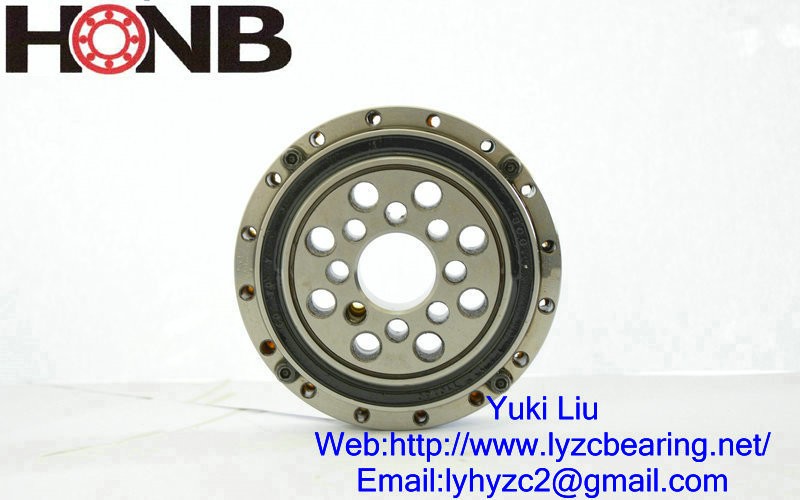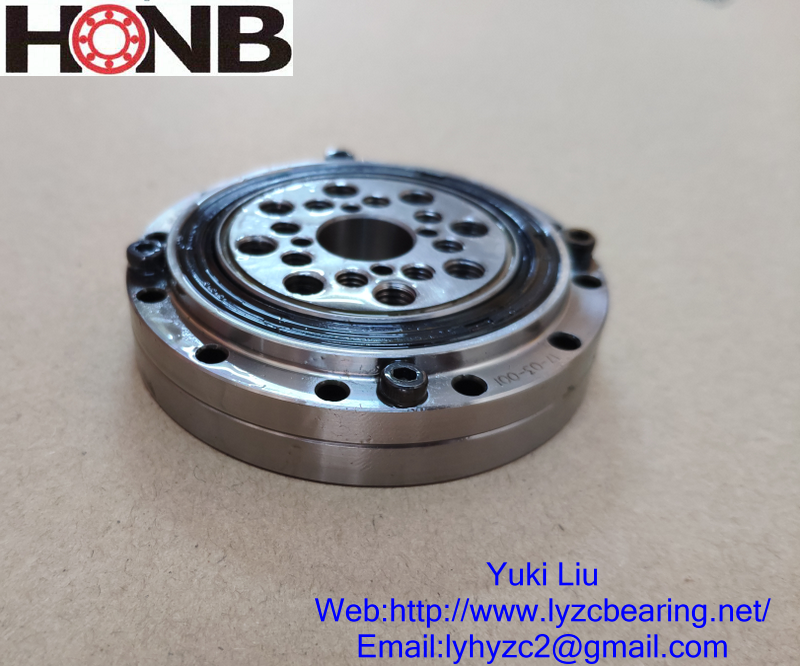Application of Crossed Roller Bearing on CNC Vertical Lathe
Author: hongyuanTime:
In the vertical lathe equipment, the rotary table is one of the core structures that reflect the overall performance of the machine tool and achieve the accuracy of the workpiece processing. We require it to run at high speeds and withstand heavy workpieces, while having precise running accuracy and very high anti-overturning moment capabilities, and the bearings that support the worktable are the key to accomplishing this important mission. Previously, most of the workbenches in China chose to use thrust bearings in conjunction with radial bearings. This arrangement has a complicated structure and uses a lot of materials. Especially when placing large box parts, the space of the entire machine tool is even larger. Bearing installation and pretension adjustment are also more difficult, and alignment is more difficult to ensure, and the overall accuracy of the worktable is difficult to improve.(HONBbearing02)
 1. Runout accuracy
1. Runout accuracy
 1. Runout accuracy
1. Runout accuracy
Bearing runout can be divided into synchronous runout and asynchronous runout. Among them, the impact of synchronous runout on the overall runout of the worktable can be minimized by grinding the work surface, but the impact of asynchronous runout cannot be eliminated in this link. It mainly It is determined by the tolerance of the outer diameter of the roller and the roundness. Therefore, the better the control of the asynchronous runout of the bearing, the smaller the final radial and axial runout of the table, that is, the higher the running accuracy. When choosing a bearing brand and accuracy class, it is recommended not to focus only on the bearing assembly runout, but rather understand the accuracy standards that affect the asynchronous runout of the bearing.
2. Bearing coordination
It is recommended that the inner ring and shaft, outer ring and ring gear should be tightly matched when selecting the bearing. Since the outer ring is a rotating part, the tight fitting amount should be slightly larger; the inner ring will be pressed downward by the end cover and adjusted to a certain pre-tightening amount, so the tight fitting amount should be slightly smaller. However, if the inner ring is considered to be a stationary component and the inner ring and the shaft are designed to be loosely fitted (there is a radial gap between the inner ring and the shaft), it is possible to install the inner ring, lock the inner ring, or load the bearing When the circle is deviated, eccentricity occurs. This eccentricity will cause stress concentration at the boundary of the contact area between the roller and the raceway, causing severe scratches, craters, and spalling, ending the bearing life earlier.
3. Geometric tolerance
The mounting surface of shaft and ring gear is required to have flatness, perpendicularity, roundness and cylindricity consistent with precision bearings. Controlling these shape and position tolerances can not only obtain better assembly accuracy, but also avoid stress concentration caused by excessive eccentricity of the inner and outer rings of the bearing and prolong the service life of the bearing. Regarding the processing standards of geometric tolerances, it is recommended to consult the bearing supplier to match their bearing accuracy.
4. Axial preload
In the cutting test of standing lathes, great attention is paid to the roughness of the end face and outer circle of the workpiece, and one of the keys to determine its merits is the rigidity of the system. The system rigidity includes the rigidity of the frame structure, the rigidity of the supporting bearing, etc., where the rigidity of the bearing often depends on its axial preload.

5. bearing installation considerations
This section focuses on the operation details that require additional attention during the installation process:
A. When the lower inner ring of the bearing is installed into the shaft seat and returned to room temperature, you need to use a 0.025mm feeler gauge to check the gap between the inner ring and the shoulder to ensure that it has been installed in place; the same is true for the outer ring. Hit the end face with a medium hardness steel rod to make it in place to avoid eccentricity of the inner and outer rings due to inadequate installation and damage to the bearing.
B. After the installation of the lower inner ring, outer ring and roller of the bearing, adjust the parallelism of the end surface of the ring gear and the end surface of the main shaft (the plane shown by the red line in the figure) so that the lower inner ring is parallel to the outer ring; After installation, rotate the bearing forwards and backwards to position the rollers and spacers correctly, then adjust the parallelism between the end face of the ring gear and the end face of the upper inner ring, and finally ensure that the three bearing rings are level, thus avoiding eccentricity between the bearing rings. Stress concentration, damage the bearing.
C. After the installation of the upper inner ring is completed, the bearing must be rotated forwards and backwards so that the rollers and spacers are automatically adjusted, and then gaskets and end caps are added to lock. If the rollers are skewed and locked on the raceway without turning the bearing, problems such as severe heat generation, raceway burns, scratches, and loss of accuracy will occur during bearing operation.
D. Tighten the end cap bolts one by one according to the diagonal sequence (as shown in Figure 6), the tightening torque can be increased from 3 to 4 times to the final tightening amount, to prevent the end cap from being pressed due to the force on both sides Unevenness or excessive force and skew, making the inner circle eccentric. At the same time, you can also check the level of the end cap again after each round of locking to eliminate eccentricity as much as possible.

Previous Page:Steps of bearing maintenance
Products
- YRT rotary table bearing
- YRTS rotary table bearing (high speed series)
- YRTM with integral angular measuring system series
- ZKLDF axial angular contact ball bearing series
- RA series crossed roller bearing
- SX series crossed roller bearing
- CRBH series crossed roller bearing
- RE series crossed roller bearing
- RU series crossed roller bearing
- RB series crossed roller bearing
- XR/JXR series crossed taper roller bearing
- Crossed roller bearing
Contact Us

✉️ bearing20@hyzcgroup.com
📞 +86 15236685001





